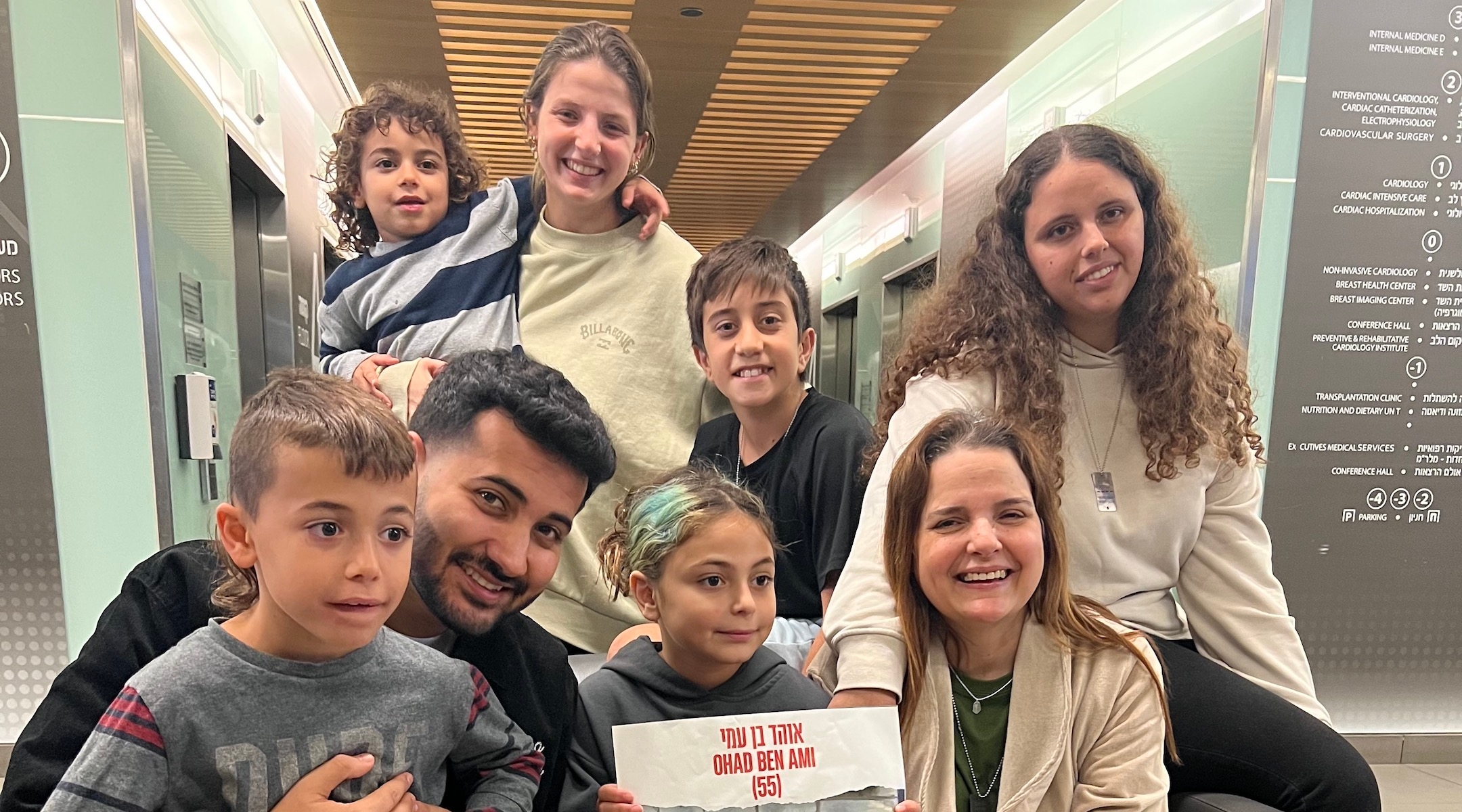How an Israeli TikToker’s little-known song became the soundtrack to emotional wartime reunions
In hundreds of videos, a Hebrew song with the lyrics “Good days will come…” builds to its crescendo as the soldier’s family falls upon him

Yagel Oshri, whose song “Getting Over Depression” has become an unofficial anthem of Israel’s war with Hamas, poses with Israeli soldiers at an army base during a recent goodwill tour. (Courtesy Yagel Oshri)
(JTA) — An Israeli reservist on leave from the war in Gaza sneaks back into his house in the middle of the night to surprise his wife and sons. Another opens the door of his daughter’s preschool classroom and steps inside. Another stands behind his mother’s desk at work, waiting for her to turn and see him.
In each video, and hundreds of others just like them, a Hebrew song with the lyrics “Good days will come…” builds to its crescendo as the soldier’s family falls upon him.
The song seems tailor-made as an anthem for the emotional reunions that are providing Israelis a rare spark of hope at a grim time. “Even in the darkest hours of the night, there will always be a small star that will shine for you, for yourself and the way home,” the singer croons. “It’s always darkest before the sunrise.”
Yet the singer, Yagel Oshri, didn’t write the song for the war that the soldiers have been called to fight, which began Oct. 7 when Hamas attacked southern Israel, killing 1,200 and taking hundreds of hostages. “Two years ago I wrote the first version — not even from my personal perspective,” says Oshri, 23. His friend was depressed because her boyfriend dumped her, so he was trying to tell her, “Just smile, it’s all OK.”
Few people heard the song since, even as Oshri became one of Israel’s rising stars on TikTok. As the driving force behind the Oshri Family account, Oshri accumulated followers with his made-for-social-media humor, often involving his two younger brothers and mother in videos made in the family home in Moshav Elikhin in central Israel. But behind the scenes, he was struggling in a way that changed the way he thought about his song.
“When I went through a depression, I realized you can’t just smile and get over it,” he said. So six months ago, he went to hit-making musician Offir Cohen’s studio and played him the first four lines of the revised song: “The family, friends, maybe going out/deep profound conversations late at night/dealing with change, old habits/the soul is at war with karma…”
Cohen told him to drop everything and the two went to the studio with a guitar and within “seven minutes” finished the song — lyrics, melody and all. “It flowed like a river,” Oshri recalls. They released the song on Aug. 15.
Galgalatz, the premier pop radio station in Israel, rejected it for their weekly playlist. “Maybe they just didn’t get it, they didn’t understand the heaviness,” Oshri says, with no bitterness. He uploaded the song to Apple Music, Spotify and, of course, TikTok instead.
There, “Getting over Depression” gained a small following. In late August, a clip Oshri posted on TikTok of himself playing on a keyboard with his brother at his side garnered dozens of supportive comments. By the end of September, he posted a duet in tribute to what he said was being tagged 1,000 times on the platform.
But nothing could have prepared him for what happened after Oct. 7. Like so many other Israelis, he was personally affected by the attack when his brother’s partner, 22-year-old Kim Dukarker, was killed along with hundreds of others at the Nova music festival. And like so many others, he sprang into action, giving back however he could — by performing for families evacuated from danger zones and soldiers called up as part of the biggest mobilization in Israel’s history.
Between the live shows and the ability of users on Instagram and TikTok to add favorite songs as soundtracks to their clips, “Getting over Depression” soon became ubiquitous — particularly when soldiers used it as a soundtrack to their surprise visits home.
Now, Israelis can’t get away from the song. It’s looping endlessly on the radio, including on Galgalatz — “I’m happy they get it now,” Oshri said — and in countless social media videos. Entire army units have sung along to the song. There’s even a spoof of a reservist trying to escape it, and TikTok videos of American Jewish musicians, like Orthodox singer Aryeh Kuntzler, performing it.
The song has streamed more than 3.5 million times on Spotify, making Oshri the second-most listened-to Israeli artist, and has been used on 17,000 TikTok videos, mostly of reunions. A prominent TV presenter shared the music set against clips of just-freed hostages, including 9-year-old Ohad Munder running through a hospital corridor to hug his family. That video got over 1 million views.
“I feel like God gave me a mission, to make people happy with this song,” Oshri says. “It’s a happy song. I think that Israel, in its DNA, is a happy nation. We like to say ‘Am Yisrael Chai,’” or the Jewish people live, a traditional phrase that itself has been renewed in a wartime song released Oct. 19, by Eyal Golan. “We like to say, ‘There will be good days to come.’”
Oshri’s song joins in a long tradition of Israeli songs giving hope at tenuous moments, including the classic “Yihiye Tov,” or “Things Will Get Better,” which a 22-year-old David Broza wrote with poet Yonatan Geffen in 1977 on the eve of peace negotiations with Egypt.
With every war, a few songs capture the public’s imagination. In 1967, “We Shall Pass,” by Yehiel Mohar and Moshe Wilensky, was written to raise the morale of the country. Even more iconic was Naomi Shemer’s “Jerusalem of Gold,” written only three weeks before the war — and to which she added a new verse when Israel took control of East Jerusalem.
Sometimes singers become synonymous with wars. Yehoram Gaon, who sang “The Last War” in 1973 for the troops during the Yom Kippur War (“I promise you little girl, this will be the last war…”) is now back with a new version of his 1984 patriotic battle cry, “You Won’t Beat Us,” whose video features flag-waving soldiers and rumbling tanks.
“Music can produce shared allegiances and feelings of unity. In times of extreme crisis, people turn to the music that they most need as an attempt to stabilize their emotions [so they can] continue and persist,” says Murray Forman, professor of Media & Screen Studies at Northeastern University in Boston. After 9/11 he wrote the analysis “Soundtrack to a Crisis: Music Context, Discourse,” in the journal Television and New Media.
“Music has acquired new significance in relation to the atrocities of the terrorist actions,” he wrote then. But what he didn’t consider 20 years ago was that “along with the music of peace and healing and mourning and patriotically infused anger and nationalistic chauvinism (which each proliferated in the U.S. after 9-11 and probably does in other such circumstances), there might also be music of fear and dread and even celebration, depending on what communities we’re talking about,” he said.

Yagel Oshri meets and sings with the family of Raz Ben Ami, bottom right, who was released the day before as part of deal between Hamas and Israel. Her husband Husband Ohad remains captive in Gaza. (Courtesy Yagel Oshri)
“Maybe one thing is for all sides to try to listen closely to the music each other is creating and listening to.”
A number of English-language songs have also been adopted to epitomize the war. Skylar Grey’s “I’m Coming Home,” which has been used as a soundtrack for many American soldiers’ homecomings, was recently adapted in honor of the hostages still held in Gaza. Shiri Maimon sings it in a video featuring a display in Jerusalem of 240 beams of light, each representing a hostage. On Nov. 6, hundreds of the hostages’ family members gathered at Tel Aviv’s Cameri Theatre to record a version of Madonna’s “Like a Prayer,” in an event produced by Ben Yefet, who conducts Israel’s popular Koolulam singalongs.
Yet for many American Jews, Israeli anthems are a way for them to connect to the country. Yael Weinman, a lawyer from Washington, D.C., started creating shareable Spotify playlists that she called “Do Not Despair” when the war started. It included pop songs like “Out of the Depths” by Idan Reichl, “Chai” by Ofra Haza and “Hurts but Less” by Yehuda Poliker.
“For me, being in America and being so far away physically from Israel right now, it’s a way to feel closer to Israel at a time when being so disconnected is so painful,” said Weinman. She said it’s hard for many people like her not to be there. “Listening to the music is a way to feel more connected,” she says. “It’s comforting for me to listen to songs in Hebrew — it’s a way to feel comforted and not to despair.”
Oshri has been busy since the war pushed his song into the spotlight. In addition to working on new music that he hopes will bring comfort to his nation at war, he has played over 90 performances since the war started — at army bases, for wounded soldiers, for evacuated families, at funerals.
“I just sang for a kidnapped woman that was released,” Oshri says in the car from Israel, referring to Raz Ben Ami, who was released by Hamas on Nov. 29. Her husband Ohad remains captive in Gaza.
On Sunday, Oshri announced that he would begin selling jewelry with lines from his now-iconic song etched in his handwriting, with the proceeds to benefit the Israeli army.
Oshroi told JTA that every time he sings the song, in his heart he dedicates it to Dukarker. But he says he knows “Getting Over Depression” doesn’t belong to him any more. “It’s Israel’s song,” he said. “It’s the song our nation has chosen to listen to.”
This article originally appeared on JTA.org.
A message from our Publisher & CEO Rachel Fishman Feddersen

I hope you appreciated this article. Before you go, I’d like to ask you to please support the Forward’s award-winning, nonprofit journalism so that we can be prepared for whatever news 2025 brings.
At a time when other newsrooms are closing or cutting back, the Forward has removed its paywall and invested additional resources to report on the ground from Israel and around the U.S. on the impact of the war, rising antisemitism and polarized discourse.
Readers like you make it all possible. Support our work by becoming a Forward Member and connect with our journalism and your community.
— Rachel Fishman Feddersen, Publisher and CEO
























